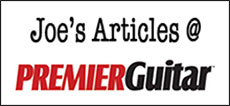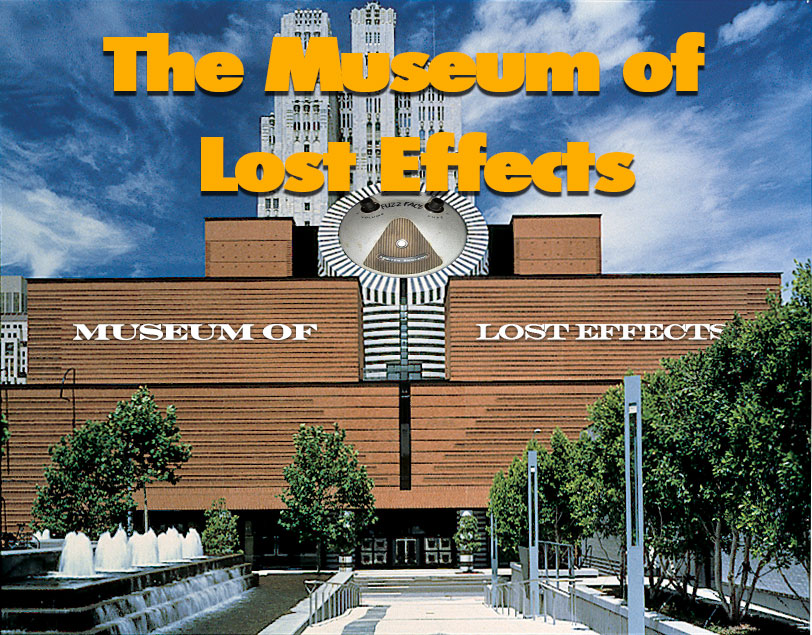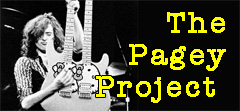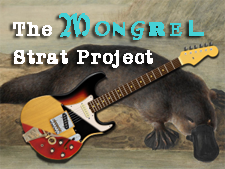Monday: Theory and Technique
Tuesday: Gear
Wednesday: Repairs and DIY
Thursday: Biography
Friday: Fiction
This week we’re talking about our favorite guitar/music books. The plan is simple: I discuss a few titles I’ve found particularly enlightening, useful, or entertaining, and then you jump in and do the same. I’ve organized the days of this week by subject matter. Today’s topic is guitar gear.
Guitar gear books seem to fall into three categories:
- Pornographic. Lavish publications featuring beautiful photos of rare instruments, often focusing on a single manufacturer or collector.
- Encyclopedic. Thick reference books covering wide swaths of guitar history.
- Pragmatic. Books that explain the inner workings of guitar technology, with an emphasis on how to turn this info to your musical advantage.
Even if I weren’t a jaded former guitar mag editor, I doubt I’d have much interest in coffee-table guitar porn books (and the occasional guitar porn magazine). Or at least, no more interest than I’d have in photos of, say, beautiful watches, speedboats, or nutcrackers. I’m not a guitar collector.

Not on my coffee table, you don’t!
Hey — stop laughing! Yeah, I own more than 20 guitars. (The exact number depends on whether I count guitars I’ve loaned out indefinitely and ones I’ve borrowed indefinitely.) I appreciate my instruments greatly, and I am very aware of how fortunate I am to have access to so many musical tools. But in the end, they are just tools to me, with little significance beyond their musical applications.
I realize this is a pretty weird attitude for a guitar dude, and one reason why I was probably never a perfect fit as a guitar mag editor. (I must be missing some crucial male gene, because I’m equally blasé about cars and sports. With rare exceptions.)

The classic reference book.
Reference books are a different story, especially the books of George Gruhn and Walter Carter, and those of Tom Wheeler. Sure, some of their weightier works have guitar porn aspects, but always paired with vast historical knowledge and the expertise of longtime industry insiders. Gruhn and Carter may know more about American guitars than anyone. But I always gravitate to Tom Wheeler’s books, and not just because he’s a longtime friend and mentor. Tom is a fine writer, an impeccable researcher (he’s been a journalism prof for the last 20 years), and he still conveys a teenager’s passion for the instrument. Tom is my hero.
(Bonus question: Has Wikipedia rendered the guitar reference book obsolete?)
But these days, the gear books that excite me most are the technically slanted, nuts-and-bolts titles. It’s one thing to ogle pretty instruments, and another to explain how they work, why they sound the way they do, and what that all means for the music we make today. And that’s why I love the books of Dave Hunter.
While most other gear books consider gear from the perspective of the historian or collector, Hunter writes as a musician. He dissects gear in a way that can help you choose your next guitar, discover the ideal guitar/amp pairing, pinpoint the perfect pickup choice or wiring mod, or inspire your next DIY project. It’s guitar history you can use. Hunter is a phenomenally gifted explainer, with a fun, friendly style and formidable research chops.

Tech knowledge you can use.
Example: Like most guitarists, I’ve learned a thing or two about pickups over the years. But when I started doing some work for Seymour Duncan a few years ago, I turned to Dave to plug the vast gaps in my knowledge. I swallowed his The Guitar Pickups Handbook whole. He covers the 80-year-history of the pickup in a way that makes you truly hear the technology. Thanks, Dave, for helping me pull the wool over their eyes rise to the occasion. I’m equally fond of Hunter’s Guitar Amplifier Handbook. More than any guitar writer I know, Dave makes the past meaningful in the present.
Okay, your turn — can you guys recommend any great books on guitars, basses, amps, or effects?








When I was still in college, or “at university” as some say, I briefly subscribed to the Journal of Guitar Acoustics. Wow, you can still get a reprint of all 7 issues for about $100!
https://www.journalofguitaracoustics.com/
As an electrical engineering student, their totally-geeky-analysis of everything was right up my alley. I remember especially the article on the Klein bridge’s attempt to maximize power transfer from the strings to the guitar’s body by exploiting impedance matching techniques, and an article written by my acoustics professor Dr. Elizabeth Cohen, where she described working on Bob Weir’s custom Ibanez including the old “pickup on rails” strategy of figuring out where the best placement was.
Dr. Cohen also wrote such page turners as “The effect of envelope on fusion of tones with inharmonic partials” https://asadl.org/jasa/resource/1/jasman/v66/iS1/pS30_s6?view=print&bypassSSO=1 and she will forever remain dear to me as the organizer of the coolest-ever-class-field-trip where we visited both Lucasfilm’s foley studio and the Grateful Dead’s rehearsal space. Here we held court with Mickey Hart who played us (very loudly) some digital recordings of helicopters he had made for the “Apocalypse Now” sound track.
Hey Joe, yourlink for Dave Hunter books actually goes to Tom Wheeler books. THought you would want to know. I love the Dave Hunter books too. Lots of great photos and cool information.
D’oh! Fixed it. Thanks!
(grabbing the mic again)
Guitar porn: https://www.amazon.com/History-American-Guitar-Tony-Bacon/dp/1871547679 Tony Bacon’s History of the American Guitar
For tube amp references, Richard Kuehnel’s books:
https://www.ampbooks.com/home/authors/richard-kuehnel/
Richard’s not afraid of throwing in “too much math”. Maybe I’m an old dog, (maybe!?!?! :cuckoo: ) but I currently find writing DSP code easier than understanding how tube amps work. And way less likely to kill you with 300 volts in the wrong place.
I’m not generally one to buy ‘coffee table’ type books and do most of my instrument research online, but I do read a lot on the physics/acoustics/electrical side of things when possible. So this may be a bit of an overlap with tomorrow’s diy style books, but I think a great starting point for anyone who wants to understand their gear better would include…
on the acoustics/design side:
Master Handbook of Acoustics by Everest (and now Pohlmann)
https://www.amazon.com/Master-Handbook-Acoustics-Alton-Everest/dp/0071603328
Acoustics for Violin and Guitar Makers by Jansson (available free here):
https://www.speech.kth.se/music/acviguit4/
Fundamentals of Musical Acoustics by Benade
https://www.amazon.com/Fundamentals-Musical-Acoustics-Second-Revised/dp/048626484X
Musical Instrument Design by Hopkin
https://www.amazon.com/Musical-Instrument-Design-Practical-Information/dp/1884365086
Guitarmaking: Tradition and Technology by Nateson and Cumpiano:
https://www.amazon.com/Guitarmaking-Tradition-Technology-Construction-Steel-String/dp/0811806405
on the electric/audio side:
Electric Guitar Amplifier Handbook by Jack Darr (although Dave Hunter’s is great and probably easier to tackle):
https://www.amazon.com/Electric-guitar-amplifier-handbook-Jack/dp/0672208482
Audio Electronics by Hood:
https://www.amazon.com/Audio-Electronics-Second-Edition-Linsley/dp/0750643323
Guitar Electronics for Musicians by Brosnac
https://www.amazon.com/Guitar-Electronics-Musicians-Reference/dp/0711902321
I’m sure we’ll get to Anderton tomorrow….
Damn, there’s a lot of stuff I don’t know! Thanks for posting such great resources! :beer:
well, I think only personally know one guy that fully comprehends the bulk of the stuff in those books, but I keep chipping away at it. The acoustics book by Everest is one of my favorites.
Man, if you ever want to do a guest post on some of the things you’ve learned, well, mi blog es tú blog.
Cheers Joe. Your offer is indeed kind, but I’ll have to think for awhile whether I actually have anything worthy of your esteemed readers. I’m more imaginative than knowledgeable. Back when I was working in live/recording sound, I’d skim this stuff to learn ‘proper’ techniques and system troubleshooting schemas. But now I tend to read it backwards, in a sense. I suppose my philosophical position is structured something like 1. The aim of instrument/venue/’gear’ design for centuries revolved around maximizing projection, optimizing the tone/timbre curve, and managing a pleasurable decay (sustain/reverb). 2. The tech is now to the point where nearly all of those factors can easily and adequately be compensated for. therefore 3. If you read between the lines of the textbooks, you may discover the errors that they corrected and creatively exploit those to reclaim some lost or absent sonic/tone territory. But since I’ve been living out of a suitcase overseas for 10 years, I just have dozens of notebooks full of hypothetical ‘what if you tried…’ conjectures and sketches. Argh, I really need to get back to my workshop are start testing some of this stuff.
A great all-rounder and one I still dip into is ‘The Guitar Handbook’ by Ralph Denyer, maybe more suited to newbies but very informative none the less.
I also really like Dave Hunters books, a particular favourite of mine is ‘Guitar Effects Pedals: The Practical Handbook’, which along with ‘AnalogMan’s guide to Vintage Effects’ are two of the best resources on guitar effects pedals that I have found.
Just got the guitar amplifier handbook last week and saw Joe’s name in it (a quote about Jeff Beck which was on the money). Great book but I’m only part way through it.
I bought Wheeler’s Strat and Fender Amplifier coffee table books. I don’t have a coffee table, but I drink a lot of coffee. Anyway, they are very well done. I read in Wheeler’s Strat book that the forward strap button on some 70s strats is mounted parallel to the fretboard rather than following the “line of the horn”. Sure enough, my 75 (that I bought used in 77 and have had in my possession for 36 years, give or take a week where it was stolen) has this particular “feature”. Worth the price of admission? No, but just the kind of detail you’ll find in a book devoted completely to Strats.
I like the Fender Amp book even more though. I really like amps.
Oh man, what on earth did I say about JB? In case you haven’t noticed, I talk a lot of crap. 😉
Oh, it was glowing about his skill and expressiveness. All true – he’s great.
I’ve had my eyes on those books by Dave Hunter, thanks for the affirmation…
What a great bunch of recommendations!
+1 on American Guitars by Tom Wheeler
If coffee table books are guitar porn, why not go full color?
The Ultimate Guitar Book by Tony Bacon
https://www.amazon.com/Ultimate-Guitar-Book-Tony-Bacon/dp/0375700900/ref=sr_1_1?s=books&ie=UTF8&qid=1370402627&sr=1-1&keywords=The+ultimate+guitar+book
Gibson Guitars 100 years of an American Icon
https://www.amazon.com/Gibson-Guitars-Years-American-Icon/dp/0972751017/ref=sr_1_1?s=books&ie=UTF8&qid=1370402698&sr=1-1&keywords=gibson+guitars+100+years+of+an+american+icon
(Not sure if the paper was printed in Madagascar or in Tenn. 🙂 )
Side note/question: Doe the name for the post matter? I was looking around your site and found a different Robert, should I pick a different posting name?
One of my favourites is Tom Wheeler’s venerable ‘the Guitar Book’, first published in 1974. It’s kind of hilarious at times, but does a great job of addressing gear and theory, as well as offering a pretty solid grounding in basic guitar maintenance.
Aspen Pittman’s Tube Amp Book is a bit clumsy in many regards, but does get the job done as an overview of amp tech and history. A bit much Groove Tubes advertising for anyone’s liking, but he was the firstest with the mostest.
I think Dave Hunter’s “Tone Manual” is pretty good, and you get an overview of everything. I have to check his amp and pedal books now…
Elizabeth Cohen could not have had her successes that she is reaping without taking a copyrighted Digital Microphone created by Dean Hajas in Canada who submitted it to her to get funding…she in turn passed this wonderful information on to Beyer Dynamic while she was working at AES without Dean's consent or knowledge….he has the letter from Beyer Dynamic to prove it!!!! Be careful who you lay homage too…..everyone has a price…even her!!!! SHAME ON YOU ELIZABETH!! This great inventor was RAPED by your DECEIT!!!